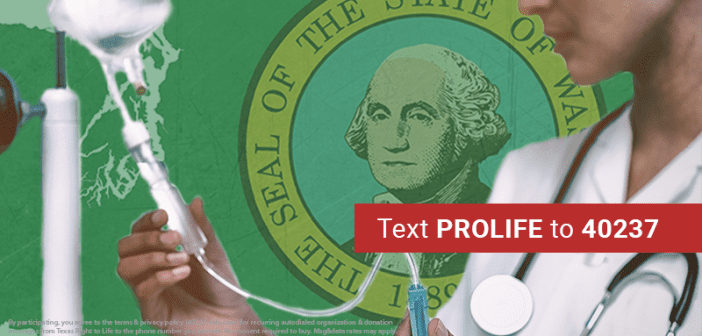In mid-February, the Washington State Legislature introduced a bill to “increase access” to assisted suicide in a plethora of dangerous ways. Though the bill ultimately failed, the authors’ vision that Washington become an indulgent outpost for assisted suicide across the United States continues.
Washington became the second state after Oregon to legalize assisted suicide in 2009 when voters approved the euphemistically named “Death with Dignity Act.” To make the law more digestible to potentially wayward voters, the bill included prophylactic guardrails that would curtail abusive, coercive, and impulsive uses of the poison pill. For example, the law requires physician involvement and the imposition of substantial waiting periods. Now, to the law’s most zealous supporters, these guardrails have become impediments to the unalloyed “good of autonomy.”
Therefore, the guardrails had to be squashed.
The new bill endeavored to accomplish this goal through three avenues. First, it would have widened the category of medical professionals who can verify that a patient’s death is expected within six months. Determining a prognosis and life expectancy is an imprecise—and often incorrect—science based on elaborate medical calculations and typically reserved to the judgment of physicians, as is the case for Washington’s existing assisted suicide law. The new bill would have expanded this authority to physician assistants and nurse practitioners who, while qualified in their own right, don’t have the expertise of licensed physicians. Inaccurate prognoses, already an unavoidable reality, would only proliferate.
The bill would have also considerably shortened the time required for a patient to obtain these life-ending poisonous “medications”—from 15 days to a mere 72 hours. This five-fold reduction in the waiting period annihilates any appearance of moral seriousness in this life-or-death decision, giving vulnerable patients and their families far less time to navigate an emotionally devastating and ethically fraught dilemma. Additionally, the medical professionals can dispense with this already dreadful 72 hour waiting period if a patient is “not expected to survive” till the end of the period. This practice would have further promoted the idea that death must be chemically imposed as quickly as possible.
Additionally, the bill would have removed the in-person dispensation requirement. Instead, physicians could mail the lethal medications to the patient, wherever he or she may reside. Because the “Death with Dignity Act” is medical professional-oriented—it is, after all, an assisted suicide law—the patient does not need to reside in Washington. This reality opens the danger to residents in other states. Texans, Floridians, New Yorkers, and everyone in between could theoretically engage in this deadly online shopping.
Whether physicians, nurse practitioners, or physician assistants who prescribed the lethal medication to Texans can escape liability is an open question.
Texas prohibits assisted suicide and is a member of the Interstate Medical Licensure Compact, which ostensibly permits the state to enforce our laws on physicians operating in other states of the compact, including Washington. But what is not readily clear is whether Texas’ assisted suicide law applies outside of Texas. And even if that was so, Texas could not enforce this law against nurse practitioners and physician assistants. The reason for this is that though Texas is a member of the Nurse Licensure Compact, Washington is not, and no such compact yet exists for physician assistants. Thus, Texas could fall under a bizarre scenario wherein nurse practitioners and physician assistants could supply deadly drugs to Texans, but physicians could not. Who needs medical school, anyway?
Thankfully, this radical liberalization of Washington’s legal practice of assisted suicide must wait. The bill failed in a Senate committee after passing the House, though the original “Death with Dignity Act” lives on.
Still, a few points are worth exploring in light of this push for assisted suicide. First, assisted suicide exists on a slippery slope. In every jurisdiction the practice has been legal, proponents have moved inexorably to eradicate barriers that prevent access to the deadly drugs. They have likewise moved to expand the class of medical professionals who can facilitate the practice or the patients who can choose death.
In the Netherlands, the earliest and most enthusiastic adopter of euthanasia, medical professionals can kill disabled babies who don’t get to make that choice at all. While American states have not reached this level of depravity, the law is unidirectional: moving toward a wider and easier practice of euthanasia.
Next, it’s imperative Pro-Lifers oppose all forms of euthanasia. Expansions of assisted suicide are wrong because assisted suicide is wrong. Assisted suicide is wrong because all euthanasia is the intentional killing of an intrinsically valuable individual human, which is wrong. If that was not the case, then Washington’s law would not be so morally problematic. That’s why promises of safeguards are always empty and incredulous: why constrain something that they see as morally good?
Last, Texas is not an innocent bystander. We have our own form of legal euthanasia, known as the 10-Day Rule. This law allows physicians to remove life-sustaining treatment against the will of a patient or patient’s surrogate. All a physician needs to do is get the hospital’s ethics committee’s approval and give the patient 10 days to find another facility. After that short 10-day window, physicians may legally remove the patient’s treatment. The result is that in Texas, a patient who wants to live, is in a stable condition, is in a conscientious state, has a positive prognosis, and is only receiving basic life-sustaining treatment can have that treatment forcibly removed. Even Washington hasn’t gone that far.
The Washington Legislature is certain to replicate their attempt to expand their assisted suicide law. Other states may do so as well. Pro-Lifers must oppose these efforts at every step. But if there’s one lesson to come out of these exploits, we’ve learned that we must not become singularly focused on the most conspicuous and brazen injustices. We must always remain watchful of the evil that brews in our own backyard.

